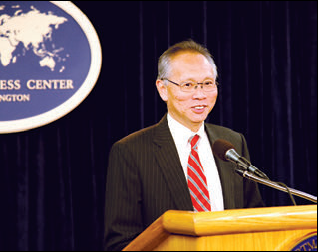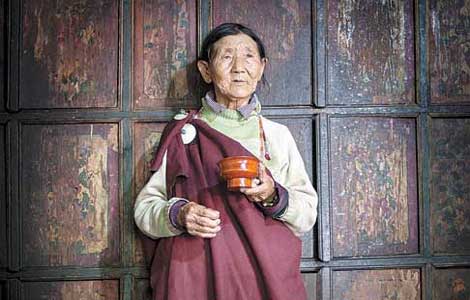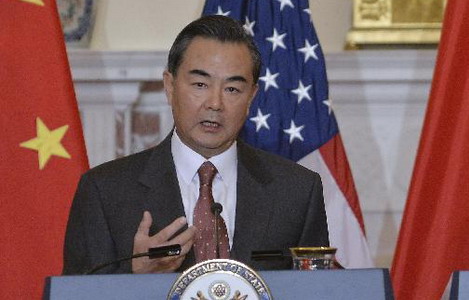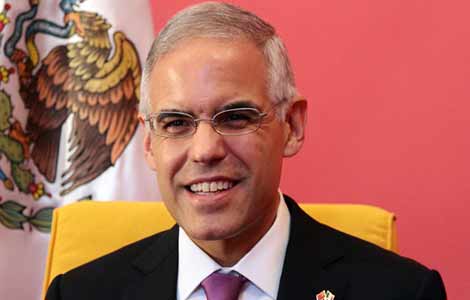Trade treaties trade spotlight
Updated: 2013-09-19 13:47
By Chen Weihua in Washington (China Daily)
|
||||||||
APEC, TPP, and RCEP are all in play, and experts talk about overlap and convergence
Just before leaders of the 21 Asia-Pacific economies meet in Bali, Indonesia, early next month for an Asia-Pacific Economic Cooperation (APEC) meeting, two regional free trade agreements under negotiation are drawing attention.
US officials said the Trans-Pacific Partnership (TPP) and the Regional Comprehensive Economic Partnership (RCEP) are not mutually exclusive.
Arrow Augerot, deputy assistant US Trade Representative for APEC affairs and localization barriers to trade, said the US understands the motivation behind the different negotiations.
“Given the dynamic of trade and investment in the Asia-Pacific region, it's not surprising that there is more than one large-scale regional free trade agreement being negotiated,” she said at a press conference in Washington on Wednesday.
"They'll certainly benet the economies by being negotiated at the same time," said Augerot, adding that the US doesn't view the RCEP as a counterbalance to the TPP.
 |
|
Bob Wang, senior official for APEC at the State Department, talks about the US' agenda for the upcoming APEC meeting in Bali, Indonesia, at a press conference in Washington on Wednesday. SUN CHENBEI / CHINA DAILY |
But she said the US will focus on the TPP. President Obama has requested a conclusion to the TTP negotiations by year's end.
The US-led TPP is being negotiated by 12 countries, which include the US, Australia, New Zealand, Canada, Mexico, Brunei, Malaysia, Singapore, Vietnam, Chile, Peru and Japan.
China has so far been excluded from the TPP talks. The initial Chinese reaction to the TPP has not been positive, with some Chinese experts calling it a US economic containment policy towards China. However, in recent months, Chinese o cials have expressed an interest in learning more about the negotiations.
China, meanwhile, has been actively participating in the RCEP negotiations led by the Association of Southeast Asian Nations (ASEAN). RCEP, which is expected to be concluded by the end of 2015, includes 10 ASEAN nations and its six Free Trade Agreement partners, China, Japan, the Republic of Korea, India, Australia and New Zealand.
Chinese officials have also talked about a nal convergence of the TPP and RCEP in the years to come to ultimately become an Asia-Pacific Free Trade Agreement.
Some US experts, such as Nicholas Lardy at the Peterson Institute, believe the US side should encourage China to participate in the TPP discussion, adding that it's the best way of becoming informed of what the potential members are aiming for.
"It doesn't mean that China would necessarily sign any agreement. ey might decide the cost may exceed the potential benets. I think they should become involved," Lardy said.
Some experts believe China might use its next year's status as APEC host country to push for the agenda.
Bob Wang, a senior ocial for APEC at the State Department, said at some point all these processes can be transparent and the discussions that go on in these types of agreements will be useful to every country.
Wang said the Asia-Pacic region as a whole is a model for the world in its pace of development.
He said he had discussed with Chinese ocials back in Beijing the topics for APEC in 2014, when China plays the host.
"We all believe 2014 will be a very good year for trade liberalization among other things," he said.
"I think we've been discussing already," said Wang, adding that it will be a good opportunity to discuss it further in Bali when a number of government ministers are there.
"Clearly the torch has been passed to China in 2014. The question is what that priority (for China) might be will certainly be discussed," he said.
Zhang Jun, director general of the Department of International Economic Aairs of China's Ministry of Foreign Affairs, said on Tuesday that China hopes the upcoming APEC summit makes progress in strengthening the coordination of macroeconomic policies to sustain the growth momentum of the Asia-Pacic region, to deepen the cooperation among APEC members, especially in promoting regional economic transformation, integration and inter-connectivity.
Contact the writer at chenweihua@chinadailyusa.com
(China Daily USA 09/19/2013 page1)
Most Viewed
Editor's Picks

|

|

|

|

|

|
Today's Top News
5.1-magnitude quake hits NW China
Car bombings death toll rises to 65 in Yemen
UN lauds China on food waste efforts
Chinese firms face trust deficit
13 injured in Chicago park shooting
Wang and Kerry meet in DC
Belgian zoo owner set to host Chinese pandas
Trending news across China
US Weekly

|

|













